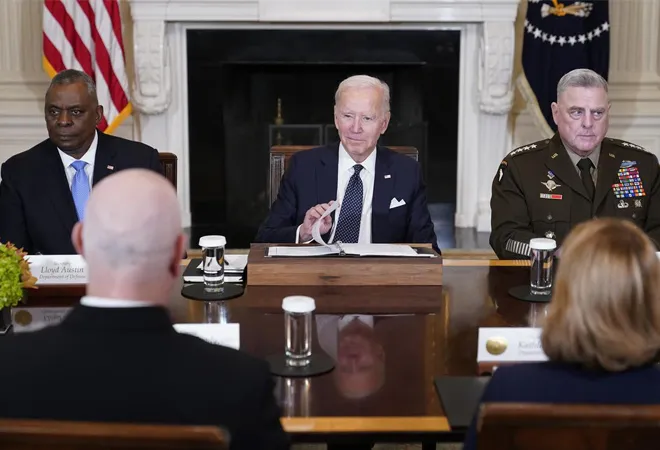
Until recently, Germany and Italy were amongst the only countries in the G7 without a national security strategy (NSS). As of 14 June, this is no longer the case for Germany as Chancellor Olaf Scholz unveiled the country’s much-anticipated first-ever
national security strategy in its post-World War II history. The 76-page document, under the “robust, resilient, and sustainable” catchphrase, lays out Germany’s security priorities in an increasingly volatile international environment.
Although the decision to draft the strategy was taken before the Russia-Ukraine conflict when the
traffic-light coalition took office in December 2021, the matter assumed greater urgency in the wake of the war, which shred Germany’s decades of reticence to security affairs and resulted in a
“Zeitenwende” or turning point. This saw Berlin pledge 2 percent of its GDP towards the North Atlantic Treaty Organisation (NATO), create a special fund to bolster the
Bundeswehr—the German armed forces and revise its long-held restrictions on arms exports.
The 76-page document, under the “robust, resilient, and sustainable” catchphrase, lays out Germany’s security priorities in an increasingly volatile international environment.
Exploring the known
On several areas, the strategy states what is already common knowledge. It underscores the German commitment to the NATO and European Union (EU) framework as well as Berlin’s key bilateral partnerships with the United States (US) and France. It identifies Russia as “the most significant threat to peace and security in the Euro-Atlantic area” in the “foreseeable future”. While emphasising the need to strengthen the Bundeswehr, the document moves bending a traditional militarised outlook to security and adopts a holistic “integrated” approach to cover challenges relating to climate change, pandemics, cyber security, healthcare, supply chain resilience, and disaster relief. Aligned with Foreign Minister Annalena Baerbock’s
statement from September 2022, “We paid twice or three times as much for every cubic meter of Russian gas with our national security”, the strategy links the economic and security spheres in a rather belated recognition.
Arriving at the strategy was no easy feat, given the many
disagreements between Scholz’s Social Democratic Party, Baerbock’s Greens, and Finance Minister Christian Lindner’s Free Democratic Party on issues ranging from China policy to sending weapons to Ukraine. The most contentious of these issues was the establishment of a National Security Council to centralise decision-making, which failed to materialise based on differences between the Chancellory and Foreign Ministry over its location.
On China, even though a separate strategy is in the works, the NSS reiterates the EU approach that labels Beijing a “competitor, systemic rival, and partner” while emphasising that the competition and rival aspects have recently gained more prominence. At the same time, the strategy, released only a few days before Chinese Prime Minister Li Qiang arrives in Berlin for government consultations, refers to China as “a partner without whom global challenges cannot be resolved”. Yet it also adopts some stark language towards its largest economic partner emphasising that China is “acting time and again counter to our interests and values” and “exerting its economic power to reach political goals”. The document’s references to reducing dependencies for raw materials and supply chain resilience are likely thinly-veiled references to China. However, even while adopting the EU and G7 language of diversification and de-risking from China, Germany continues to struggle to balance such a policy given the heavily intertwined nature of German industry with Chinese markets.
The most contentious of these issues was the establishment of a National Security Council to centralise decision-making, which failed to materialise based on differences between the Chancellory and Foreign Ministry over its location.
Where the devil is in the lack of detail
Overall, the document is predictable and does not contain any big surprises while laying out Germany’s broad approach. However, there are some stark omissions.
For starters, in sync with
Germany’s Indo-Pacific strategy released in 2020, the document links the security of Germany to the security and stability of other regions of the world. Yet it makes only one reference to the Indo-Pacific, and no references at all to its allies in the region including India, South Korea, and Japan. Strikingly, it also makes no reference to Taiwan, which is a serious security flashpoint. These exclusions could potentially send confusing signals to Germany’s partners across the globe.
The strategy also does not allude to the goal of ‘European strategic autonomy’, a pet project of French President Macron, towards which Berlin
has lacked enthusiasm. Yet while endorsing the role of the US in Europe, it does not address the uncertain future of European security amidst fears of America's future political trajectory with elections looming next year.
With respect to spending 2 percent of its GDP towards NATO (that was estimated at 75 billion euros in 2022), the document adds the vague caveat of doing so “as an average over a multi-year period.” The question of how these commitments would be funded remains unanswered, which is especially concerning in light of Lindner’s
assertions that the strategy would be implemented “at no additional cost to the overall federal budget”.
Moreover, it may be difficult to translate the strategy into actionable policy without a body or structure such as the envisaged National Security Council to effectively coordinate between multiple agencies.
In terms of partnerships, the strategy omits relevant countries like the United Kingdom (UK), and Poland—that is at the forefront of Europe’s fight against Russia. The
UK’s Integrated Review Refresh released in March this year, on the other hand, focuses heavily on bilateral partnerships, and makes several references to Germany as an “ally”. Instead, the strategy focuses more on institutions like the EU and NATO and multilateral forums such as the G7 and G20. Besides, opposition leaders such as Alexander Dobrindt have
questioned the strategy’s sensibilities when it comes to setting priorities, with its mere six mentions of ‘China’ and 71 mentions of ‘climate’.
It may be difficult to translate the strategy into actionable policy without a body or structure such as the envisaged National Security Council to effectively coordinate between multiple agencies.
The silver lining
Even while the result may disappoint, perhaps what is most important for many Germany watchers is not the content of the strategy, but the fact that such a strategy has been released in the first place. Indeed, given the country’s traditional pacifism, it is a historic moment towards the development of a stronger German strategic culture, demonstrating that security is now at the forefront of German policymaking and thought. Besides negotiations between various ministries under the tripartite coalition, even members of the public and society at large such as scientists and civil society actors were
engaged in the drafting process. The strategy has activated a long-overdue intellectual shift and is a political achievement in providing much-needed direction. This now needs to be accompanied by material and structural shifts. As Scholz
reiterated, “The strategy is not an endpoint, but a starting point”.
As Berlin continues its introspective process, the “Zeitenwende” is, indeed, in full swing. Hopefully, the upcoming China strategy will provide further answers and clarify some of the ambiguity that surrounds Berlin’s China policy.
Shairee Malhotra is Associate Fellow with the Strategic Studies Programme at the Observer Research Foundation
The views expressed above belong to the author(s). ORF research and analyses now available on Telegram! Click here to access our curated content — blogs, longforms and interviews.



 Until recently, Germany and Italy were amongst the only countries in the G7 without a national security strategy (NSS). As of 14 June, this is no longer the case for Germany as Chancellor Olaf Scholz unveiled the country’s much-anticipated first-ever
Until recently, Germany and Italy were amongst the only countries in the G7 without a national security strategy (NSS). As of 14 June, this is no longer the case for Germany as Chancellor Olaf Scholz unveiled the country’s much-anticipated first-ever  PREV
PREV


